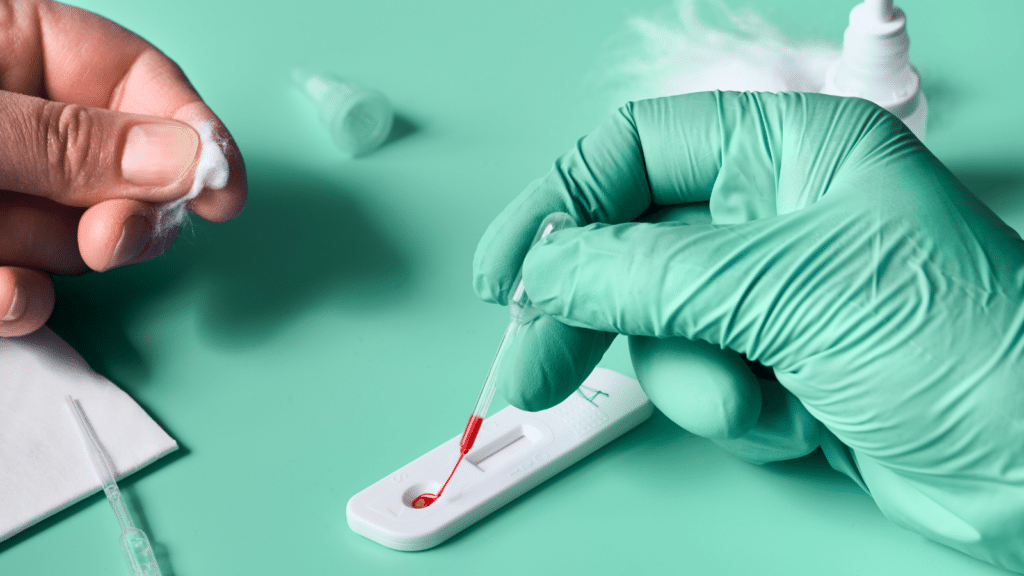Healthcare providers often turn to blood tests to gauge the efficiency of an individual’s immune system. These tests, including antibody tests, blood counts, and assessments for specific proteins like C3, offer a glimpse into how well your body can defend itself against pathogens. The blood test process involves a simple blood draw, where a small amount of blood is taken from a vein in your arm. By measuring components crucial to your immune response, these blood tests can provide valuable insights into your overall health and your body’s ability to fight infections.
Empower yourself by understanding the results of these blood tests, as it is key to assessing your immune health. For instance, a higher level of certain antibodies might indicate immunity to a disease you’ve been vaccinated against or previously infected with. On the other hand, low levels of immunoglobulins could suggest an immune deficiency, pointing to the need for further investigation. Thus, blood tests serve as a fundamental tool in evaluating and monitoring immune function, putting you in control of your health.

Unveiling the Mysteries of Immune Function Through Blood Tests
Blood tests offer a window into the complex workings of the immune system. By analyzing various components, such as white blood cell counts, antibody levels, and the presence of specific proteins, medical professionals can decipher how well your immune system is prepared to combat infections. These tests can reveal deficiencies, overactivities, and other abnormalities that might not be apparent otherwise, making them indispensable in the field of immunology.
The Role of Immunity in Fighting Infections
The body’s immune system’s primary role is to protect the body from infectious diseases, and blood tests can show how capable it is of doing so. Serology tests, for example, measure the presence or levels of antibodies in the blood, indicating whether the body has encountered certain pathogens before and if it’s likely to mount a defense against future infections. This ability to detect past infections and predict immune responses not only aids in managing and preventing diseases but also provides a sense of security and confidence in your body’s defense system.
Innate Immunity vs. Adaptive Immunity: A Closer Look
Innate immunity acts as the body’s first line of defense, offering immediate, though nonspecific, protection against pathogens. Unlike adaptive immunity, which develops memory cells following exposure to an infection or vaccination, innate immunity does not improve with repeated exposures to the same pathogen. Blood tests can measure components of innate immunity, such as natural killer cells and specific types of white blood cells, providing insights into this essential aspect of the immune response.
They highlight the importance of understanding your immune system’s health and how blood tests can help identify immune deficiencies. This knowledge can guide lifestyle changes and medical interventions. – Cleveland Clinic
Antibody Tests: Gateways to Uncovering Immune Strength
Antibody tests play a pivotal role in understanding one’s immune strength. By analyzing blood samples for specific antibodies, these tests can reveal whether an individual has been exposed to certain pathogens or how they might respond to future infections. Test results can guide strategies to strengthen your immune system, such as nutritional supplements to bolster immune cells. In the context of rising health threats, understanding and enhancing immune defenses has never been more crucial.
Understanding Antibody Titers and What They Indicate
Antibody titers quantify the concentration of specific antibodies in the blood, providing insights into immune function and history of exposure to pathogens. High titers indicate a strong humoral immune response and successful antibody production, often as a result of vaccination or past infections. Screening tests for antibody titers can assess immunity levels and guide healthcare decisions, especially in determining the need for booster vaccinations or evaluating immune system health.
Medical Tests for Assessing Immune System Health
Blood tests to check immune system health are a staple in medical diagnostics. These tests can include comprehensive panels that measure various immunoglobulins, or antibodies, providing a snapshot of immune function. By checking levels of specific proteins and cells in the blood, healthcare providers can identify potential immune system issues, such as overactive or underactive responses, offering critical information for diagnosing conditions and tailoring treatment plans.
Immunoglobulins Blood Test: What You Need to Know
The levels of immunoglobulins in your blood are telling of your body’s ability to fight infections. A blood test that measures these levels can help diagnose a range of conditions, from immune deficiencies to autoimmune diseases. For example, low levels might indicate an immune deficiency, leading to frequent infections like ear infections. Similarly, high levels of certain antibodies might indicate an autoimmune disease, where the immune system mistakenly attacks the body’s own tissues. Understanding these levels is crucial for managing health and preventing severe immune-related conditions.

Identifying and Understanding Immune Deficiencies
Immune deficiencies, characterized by the immune system’s inability to fight off infections effectively, can lead to a pattern of recurrent and severe illnesses. Identifying these deficiencies early through blood tests is not just crucial, it’s urgent. Early detection can be crucial for implementing treatments that can improve your quality of life and, in some cases, be lifesaving. Understanding the underlying cause of these frequent infections can help in tailoring specific interventions and therapies, underscoring the importance of regular blood tests for immune system health.
Distinguishing Between Primary and Secondary Immune Deficiencies
Primary and secondary immune deficiencies differ mainly in their origins. Primary deficiencies are usually genetic, present from birth, and affect the immune system’s development. Secondary deficiencies, on the other hand, are acquired later in life due to factors like infections, malnutrition, or chemotherapy. Recognizing the type of immune deficiency is crucial for effective management, guiding the choice of treatment approaches and interventions.
The Significance of Testing for Antibody Deficiency
Screening tests for antibody deficiency are vital for diagnosing humoral immune disorders, conditions where the body struggles to produce adequate antibodies. These tests can identify individuals who are at higher risk for infections and guide immunoglobulin therapy or vaccination strategies. By understanding immune function through these tests, healthcare providers can offer personalized care plans to bolster the immune response and protect against infections.
The Clinical Importance of Testing Cellular (T-Cell) Immunity
Newborn screening for cellular, or T-cell, immunity is a critical step in identifying severe immune deficiencies early in life. This screening, which assesses T-cell numbers and function, can detect conditions that might otherwise go unnoticed until the infant is exposed to pathogens. Early identification through such screening allows for timely interventions, significantly improving health outcomes for affected individuals.
Neutrophil Function Tests: Decoding the First Line of Defense
Laboratory tests assessing neutrophil function are crucial for understanding the body’s innate immune response. Neutrophils, a type of white blood cell, play a key role in fighting infections, especially bacterial and fungal. Evaluating their function can reveal important information about the immune system’s first line of defense, guiding treatments for conditions characterized by frequent or severe infections.

Evaluating Immune System Performance
Evaluating the performance of the immune system often involves a combination of clinical assessments and laboratory tests. Techniques like bone marrow analysis and clinical trials are at the forefront of understanding and treating immunodeficiencies. These approaches, along with replacement therapy, offer hope for a permanent cure for certain immune disorders, highlighting the importance of continuous research and innovation in immunology.
Normal vs. Abnormal Laboratory Values: Deciphering Your Results
Interpreting the results of immune-related blood tests requires an understanding of reference ranges, which vary by age and gender. These ranges are determined by testing large groups of healthy individuals and applying statistical methods to define what’s considered normal. However, it’s important to remember that being slightly outside of these ranges doesn’t necessarily indicate a problem, as normal values can vary among individuals. Consulting with healthcare providers for a comprehensive analysis is essential for accurate diagnosis and treatment planning.
Interpreting Immunoglobulins Test Results: Insights into Immune Health
Understanding immunoglobulins test results is crucial for assessing immune health. These tests measure the levels of various antibodies in your blood, indicating how well your immune system can respond to infections and diseases. High or low levels of immunoglobulins, such as IgG, IgA, IgM, and sometimes IgE, can signal different health conditions. For example, elevated IgG levels might indicate a recent infection or an immune system that is on high alert, while low levels could suggest an impaired ability to fight infections. By comparing these results to age-matched controls, healthcare providers can offer insights into your humoral immunity status.
Immunity Tests: How Often Should You Check?
The frequency of immunity testing varies based on individual health conditions and exposure risks. Generally, it’s advisable to undergo immunity testing when there is a clinical indication, such as suspected immune deficiency or before receiving certain vaccinations. Regular health check-ups may also include antibody tests to ensure that previous vaccinations still provide protection. Ultimately, the decision should be guided by a healthcare provider based on your medical history and current health status.
Factors Influencing Immune Response and Test Frequency
Several factors can affect immune response and dictate the need for frequent testing. Age, lifestyle, underlying health conditions, and exposure to infectious diseases all play a role in immune function. For instance, older adults or individuals with chronic illnesses may require more frequent monitoring. Additionally, those who have recently received vaccinations might undergo testing to confirm the development of appropriate antibody levels. Understanding these factors helps tailor a personalized schedule for immunity testing, ensuring optimal health management.

Enhancing Immune Function: Is It Possible Through Medical Intervention?
Yes, it is possible to enhance immune function through medical interventions. Screening tests for humoral immune function, including measuring levels of immunoglobulins, are standard practices. These interventions aim to identify deficiencies and provide targeted treatments, such as immunoglobulin therapy for those with low antibody levels. Moreover, vaccinations play a crucial role in boosting the immune system by training it to recognize and combat specific pathogens effectively.
Lifestyle and Its Impact on Immune Health
Lifestyle choices significantly impact immune health. Factors such as diet, exercise, sleep, and stress management contribute to the overall functioning of the immune system. A balanced diet rich in vitamins and minerals supports immune cell production, while regular physical activity promotes circulation, helping immune cells patrol the body more effectively. Adequate sleep and stress reduction are also crucial, as they help regulate immune responses. By adopting a healthy lifestyle, individuals can enhance their body’s natural defenses against infections and diseases.
Can You Improve Your Immune System? Separating Fact from Fiction
Improving your immune system is possible, but it’s important to distinguish evidence-based strategies from myths. Clinical trials have shown that certain lifestyle adjustments, such as reducing stress levels, eating a balanced diet, and engaging in regular physical activity, can strengthen your immune system. However, the effectiveness of supplements and other quick fixes is often exaggerated. For those with recurrent infections or autoimmune diseases, consulting the Immune Deficiency Foundation or a healthcare provider for tailored advice is essential. Real improvement comes from sustainable lifestyle changes and, when necessary, medical intervention.
Medical Interventions for Boosting Immunity
Innate immunity, the body’s first line of defense against invaders, can be supported through medical interventions. These may include vaccinations, which prime the immune system to recognize and combat pathogens effectively. For individuals with specific immune deficiencies, treatments such as replacement therapy for missing or dysfunctional immune components can be life-changing. These interventions aim to restore or enhance the innate immunity’s ability to protect the body from harmful pathogens.
Vaccinations and Immune System Response: A Synergistic Relationship
Vaccinations create a synergistic relationship with the immune system, enhancing its ability to fight off diseases. By introducing a harmless component of a pathogen, such as a deactivated virus, the immune system is trained to recognize and combat the invader more efficiently. This process often involves the production of antibodies by the bone marrow, providing long-lasting protection. For some conditions, replacement therapy may also be used to supplement the immune system’s response, ensuring optimal defense against future infections.

Navigating the World of Immunity Blood Tests
Immunity blood tests play a crucial role in assessing and monitoring immune system health. These tests can detect antibodies produced in response to infections or vaccinations, providing valuable information about an individual’s immune status. For infectious diseases that are preventable through vaccination, such as chickenpox and hepatitis B, immunity blood tests offer insights into whether additional vaccinations or booster shots are needed. Understanding these tests helps individuals and healthcare providers make informed decisions about disease prevention and immune health management.
Preparing for an Immunoglobulins Blood Test: Steps to Follow
Preparing for an immunoglobulins blood test involves a few key steps. Since these tests measure antibodies in your blood to fight off infections and diseases, it’s important to inform your healthcare provider about any current infections or medications you’re taking, as these can influence test results. Typically, no special preparation is needed, but fasting might be required in some cases. The test involves drawing blood from a vein in your arm, a process that is quick and causes minimal discomfort.
Risks and Considerations: What to Expect During and After the Test
While immunoglobulins blood tests are generally safe, slight pain or bruising at the spot where the needle was inserted is common. In rare cases, there might be ongoing pain or bruising at the site, but this usually resolves on its own. It’s important to maintain communication with your healthcare provider about any discomfort or concerns following the test. Understanding these potential risks and considerations helps ensure a smooth testing process and accurate interpretation of results.
When to Seek Medical Advice: Signs of a Weakened Immune System
Key indicators of a weakened immune system include frequent or recurrent infections, such as sinus infections, ear infections, and more severe conditions like pneumonia or meningitis. If you’re experiencing these symptoms, it’s crucial to seek medical advice. Tests to measure antibody levels can help diagnose underlying issues, such as variable immunodeficiency, which may make individuals more susceptible to certain infections. Early detection and management of immune deficiencies are essential for maintaining health and preventing complications.
Immunocompromised vs. Immunodeficient: Understanding the Difference
Understanding the distinction between being immunocompromised and immunodeficient is vital for accurate diagnosis and treatment. Individuals with immunodeficiency have a congenital or acquired condition that impairs the immune system’s ability to fight infections, often due to low antibody levels or immune cell function. Meanwhile, immunocompromised individuals may have a temporary reduction in immune response due to factors like kidney disease or certain medications. Recognizing the difference helps tailor treatment strategies effectively.

Beyond the Test Results: Living with Immune System Challenges
Living with immune system challenges requires a comprehensive approach that goes beyond test results. Regular monitoring through screening tests, including checks for immune cells and unique antibodies, is crucial. Diagnostic tests can offer insights into the immune system’s functionality and the presence of any genetic mutations. Engaging with healthcare providers to ask questions about your results and understand your condition is essential. Organizations like the Cleveland Clinic provide resources and support for managing life with primary immunodeficiency and other immune system challenges.
Managing Life with Primary Immunodeficiency (PI)
Managing life with Primary Immunodeficiency (PI) involves a combination of regular immunological tests, personalized treatment plans, and lifestyle adjustments. Immunoglobulin levels and antibody responses are closely monitored to assess the immune system’s capability to fight infections. Complement activity and skin tests might also be conducted to evaluate overall immune function. By working closely with healthcare providers, individuals with PI can lead fulfilling lives, despite the challenges posed by their condition.
The Role of Advanced Research and Clinical Care in Improving Quality of Life
Advanced research and clinical care are cornerstone elements in enhancing the quality of life for individuals facing immune system challenges. These efforts focus on understanding the complex mechanisms of the immune system and developing treatments that can more effectively target diseases. Through clinical trials and research studies, scientists and doctors are able to create new medications and therapies that improve immune function, reduce symptoms, and sometimes even cure immune-related illnesses. This progress not only benefits those with primary immunodeficiency diseases but also offers hope and improved care options for a broader range of conditions.

The Future Is Bright: Advancements in Immunity Testing and Treatment
The landscape of immunity testing and treatment is evolving rapidly, thanks to relentless research and technological advancements. Today, we stand on the brink of breakthroughs that promise more precise diagnoses and personalized treatments. Innovations in genomics and biotechnology are paving the way for therapies that can be tailored to the genetic makeup of an individual, enhancing the effectiveness of treatment plans. As we move forward, the integration of these cutting-edge technologies in clinical settings is expected to dramatically improve outcomes for patients with immune system disorders.
From Laboratory to Lifesaving Treatments: The Journey of Immunological Research
The path from laboratory research to lifesaving treatments is a testament to the dedication and innovation in the field of immunology. This journey begins with basic research, exploring the fundamental aspects of the immune system, and extends through to the development of new therapies and vaccines. Each breakthrough, from understanding how natural killer cells function to unraveling the complexities of autoimmune disorders, contributes to a growing body of knowledge that informs clinical practice and leads to more effective treatments for those with immune deficiencies.
The Emerging Role of Genetics in Immunity and Its Implications for Testing
Genetics plays a pivotal role in shaping our immune system, influencing how we respond to pathogens and develop certain immune-related conditions. The discovery of genetic markers associated with immune function has opened new avenues for testing and treatment. By analyzing an individual’s genetic profile, healthcare professionals can now predict susceptibility to specific diseases, tailor vaccinations, and develop personalized treatment plans. This genetic insight is particularly crucial for diagnosing and managing autoimmune disorders, where the immune system attacks the body’s own tissues.

Empowering Yourself Through Knowledge and Action
Empowerment in managing one’s immune health comes from a combination of knowledge and proactive engagement. Understanding the basics of how the immune system works, recognizing the signs of potential immune dysfunction, and being aware of the latest advancements in treatment can significantly impact an individual’s ability to advocate for their health. Taking action by maintaining a healthy lifestyle, staying informed about immunological research, and consulting with healthcare professionals can all contribute to stronger immune health and better overall wellbeing.
How to Interact With Your Healthcare Provider for Optimal Immune Health
Effective communication with your healthcare provider is essential for managing immune health. It begins with a thorough discussion of your medical history, including any instances of autoimmune disorders or recurrent bacterial infections. Be prepared to share information about your family history of immune-related diseases and any lab tests you’ve undergone. A proactive approach, asking questions about your immune system’s health and discussing the frequency of immunity testing, can lead to more personalized care and better outcomes.
Keeping Up With Immunological Advances: Resources for Ongoing Education
Staying informed about the latest in immunology requires access to reliable resources. For those looking to deepen their understanding of immune health, numerous avenues offer up-to-date information, including medical journals, online courses, and webinars hosted by immunological societies. Engaging with these materials can empower individuals with the information and knowledge to make informed decisions about their health, participate in discussions about new treatments, and recognize the significance of advancements in immunity testing and treatment.

Your Immune System Decoded: A Comprehensive Conclusion
The immune system is an intricate network designed to protect us from external threats and internal imbalances. Understanding its complexity through blood tests gives us valuable insights into our health and equips us with the knowledge to address potential issues proactively. Whether it’s through identifying antibody deficiencies, assessing the health of your immune system, or navigating treatment options, the advancements in immunology offer hope and actionable pathways for individuals seeking to maintain or improve their immune health.
Embracing the Complexity of Immunity Through Blood Tests
Blood tests play a crucial role in unraveling the complexities of the immune system. By measuring various components, such as antibody production and the presence of specific cells, healthcare providers can assess the health of your immune system. Understanding the results of these tests, in the context of your medical and family history, allows for a comprehensive view of your immune health. This understanding is essential for diagnosing infectious diseases, identifying potential immune deficiencies, and developing effective treatment plans.
Next Steps After Testing: How to Navigate Your Immune Health Journey
After undergoing immunity testing, the next steps involve interpreting the results and understanding their implications for your health. A dialogue with your healthcare provider about antibody production levels and what they indicate about your immune function is crucial. Based on these discussions, you may explore treatment options, lifestyle changes, or further testing. Staying informed and engaged with your immune health journey is key to navigating the challenges and opportunities that lie ahead in managing your wellbeing.